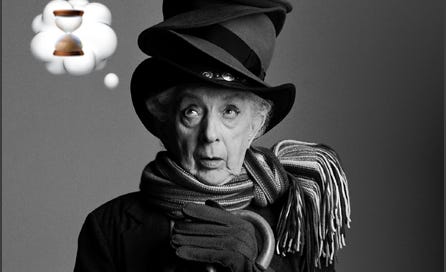Imagine your life expectancy at birth is a mere 52 years. You somehow manage to live 10 years beyond that, all of them in penniless obscurity.
Then you publish a memoir to little notice. A few years later, it’s turned into a documentary. A few years after that, it becomes a movie — and then, at the age of 67, you become famous. You create a one-man show, move to a new country, become the subject of a song by Sting, and nearly double your actuarial estimate by living to 90 — or, as you say, 100 with ten years off for good behaviour.
Such was the improbable life of Quentin Crisp, gay icon, Englishman in New York, former artist’s model, and fully formed wit, though his view of life’s grand pageant was considerably bleaker:
“You fall out of your mother’s womb, you crawl across open country under fire, and drop into your grave.”
And:
“To what do I attribute my longevity? Bad luck.”
There’s a pop-psychology theory that sudden fame arrests development, which purportedly explains why Michael Jackson acted like he was five, Britney Spears was stuck at 11, and the Rolling Stones are geriatric teenagers. Crisp offers a singular and probably irreplicable data point on the other end of the age spectrum: As a newly famous senior citizen, he had decades of material to mine. And so in three slim books and countless interviews, he could toss off what he termed a “a hail of epigrams” like:
“If at first you don't succeed, failure may be your style.”
“Decency must be an even more exhausting state to maintain than its opposite. Those who succeed seem to need a stupefying amount of sleep.”
“Euphemisms are unpleasant truths wearing diplomatic cologne.”
“Never sweep. After four years the dirt gets no worse.”
“If Mr Vincent Price were to be co-starred with Miss Bette Davis in a story by Mr Edgar Allan Poe directed by Mr Roger Corman, it would not fully express the pent-up violence and depravity of a single day in the life of the average family.”
As per those honorifics, Mr Quentin Crisp extended old-school manners all the way to heaven, referring to the supreme being as Mr. God. He was openly and proudly gay from adolescence, which meant he endured verbal and physical abuse for most of his life. As Sting put it, “It takes a man to suffer ignorance and smile / Be yourself no matter what they say.”
Happily for my purposes, Crisp published a short and lively essay on the nature of wit. In one sharp paragraph, he offered a philosophy and definition that stands among the best I’ve encountered:
Wit is the voice of style.
One might almost define an aphorism as an ugly truth gracefully phrased, or say that wit is any comment on the human condition made in a way that is memorable. Brevity is not the soul of wit. Truth is its soul and brevity its body, but since by now all truths are foregone, it can only be the form that we give them that is our individual contribution. Those who sink to the mere trading in facts insult their hearers. We can be offered only two kinds of information — what we already know, which is boring, and what we do not, which is humiliating.
This is hard-won wisdom of age: Everyone already knows everything they want to know. To avoid boring or humiliating them, you’d best communicate in an individual, memorable, and authentic style, and the point of having such a style is “to be more like yourself than nature has made you.”
As Crisp responded when asked who he thought he was: “What a stupid question. It must have been obvious that I didn’t think I was anybody else.”
Quick quips; lightning
“Senescence begins
And middle age ends
The day your descendants
Outnumber your friends.”
— Ogden Nash
“ As I grow older and older,
And totter towards the tomb,
I find that I care less and less
Who goes to bed with whom.”
— Dorothy L. Sayers
“One should never make one’s début with a scandal. One should reserve that to give an interest to one’s old age.”
— Oscar Wilde
Speaking of…
Stating the obvious
Facts worth remembering
GWQ No. 142 is the first of its kind to quote Sting. Quentin Crisp diagnosed Oscar Wilde as a man whose style was broken, “a sequined Band-Aid covering a suppurating sore of self-hatred.” Maybe? Crisp’s breakthrough book-turned-movie was called The Naked Civil Servant, which sounds like a trenchant critique of bureaucracy but was actually about his time as an artist’s model, which he declared as boring as a government job. Would more titular titillation have helped Elements of Wit: Mastering The Art of Being Interesting? Tap the ❤️ in style.






